Poetry
Poetry

the monumental mismemberings
the monumental misrememberings is a meditation on death. It’s a curious insight on the creative and violent ways in which Black girls, women, trans women and femmes often become displaced, experience death, and subjugation as a result of patriarchal systems in America. This debut collection of poems by Mimi Tempestt operates through this specific lens, not to romanticize the pain of Black femme bodies, but to bring light to this sadistic truth. When we turn on the television, when we log into social media, when we look in the mirror, the normalcy of how often and creatively Black women are murdered weighs on our conscience. the monumental misrememberings addresses our unwillingness to grapple with these violences, and places front and center the realities faced by Black femmes.
Size: 5" x 7.5", 88 pages
Self published by Co—Conspirator Press with the support of Women's Center for Creative Work. Designed by MJ Balvanera, Riso-printed by Neko Natalia.

The Nancy Reagan Collection
THE NANCY REAGAN COLLECTION is a response to growing up queer and trans under the rise of HIV-AIDS. Crossing genres and generations, this performance novel remixes the AIDS archive through an ever-spiraling politics and aesthetics of mourning. Alternating chapters offer up a narrative throughline composed of hallucinogenic episodes from the perspective of a nameless, grieving protagonist in the midst of the global carnage of the Reagan dynasty. Part revenge, part fantasy, the book experiments with poetic practices that challenge conceptions of memory and morality, activism and escapism, grief and beauty.
Maxe Crandall is a poet, playwright, and director. He is the author of the chapbooks Emoji for Cher Heart (Belladonna*, 2015) and Together Men Make Paradigms (Portable Press @ Yo-Yo Labs, 2014), and is the founder of the theater company Beautiful Moments in Popular Culture, which produces a poets theater series at the Stud in San Francisco. He has received fellowships from the Poetry Project, Poets House, Lambda Literary, and the Millay Colony for the Arts. Maxe is a lecturer in the Feminist, Gender, and Sexuality Studies Program at Stanford University.

Being Human Is an Occult Practice
In the essay BEING HUMAN IS AN OCCULT PRACTICE, Zurawski argues that studying and sharing literature can function as a means of enriching the impoverished definition of human created by capitalist social relations. Beginning with an analysis of Robert Duncan's description of the moment in his high school classroom when he finds himself called into a life in poetry, this essay explores the possibilities of the literature classroom at the very moment that it's being dismantled by the neoliberalization of our university systems. Zurawski argues that the literary holds a revitalizing potential precisely because of its capacity of exceeding the narrow imaginative aims of life within our contemporary social order.
Magdalena Zurawski is the author of BEING HUMAN IS AN OCCULT PRACTICE (Ugly Duckling Presse, 2020), the novel The Bruise, which won the Ronald Sukenick Award from FC2 in 2008 and a LAMBDA literary award in 2009, and the collection of poems COMPANION ANIMAL, which was published by Litmus Press in 2015 and won a Norma Faber First Book Award from the Poetry Society of America. THE TINIEST MUZZLE SINGS SONGS OF FREEDOM (Wave Books, 2019) is her most recent poetry collection. Her poem/essay Don't Be Scared is available as a chapbook from The Operating System. As an undergraduate Magdalena studied with poets Rosmarie and Keith Waldrop, C.D. Wright, and Peter Gizzi. She has lived in Berlin, New York, Philadelphia, San Francisco, and Durham, NC where she ran the Minor American Reading Series. She is currently Associate Professor of English and Creative Writing at the University of Georgia, where she directs the Creative Writing Program.

The First Books of David Henderson and Mary Korte: A Research
In 1967, the first books of two poets were published by small presses on opposite coasts of the USA: David Henderson's Felix of the Silent Forest and Mary Norbert Korte's Hymn to the Gentle Sun. In this essay, poet, scholar, educator, and publisher Iris Cushing looks at the context of these supposedly minor poets, and through research and conversation with Korte, Henderson, and Diane di Prima, reconstructs the role of small presses in the countercultural resistance of the late 1960s.
Iris Cushing is a poet, scholar, educator and founding editor for Argos Books, an independent poetry press. She is the author, most recently, of THE FIRST BOOKS OF DAVID HENDERSON AND MARY NORBERT KORTE: A RESEARCH (Ugly Duckling Presse, 2020), and Into the Long Long Time: How Mary Korte Saved the Trees (Ink Cap Press, 2019). Her poems and critical writings have appeared in numerous publications, including the Boston Review, Fence, and the Academy of American Poets Poem-A-Day series, and her poetry collection WYOMING (Furniture Press Books, 2014) won the 2013 Furniture Press Poetry Prize. She has edited three chapbooks for the Lost & Found Poetics Documents Initiative: Diane di Prima: Prometheus Unbound as a Magickal Working (Series VIII, 2019), Bobbie Louise Hawkins: The Sounding Word, and Judy Grahn: Selections from Blood, Bread and Roses (Series VI, 2016). A doctoral candidate in English at the CUNY Graduate Center, Iris is currently at work on a biographical dissertation titled Pierce and Pine: Diane di Prima, Mary Norbert Korte and the Question of Matter and Spirit.
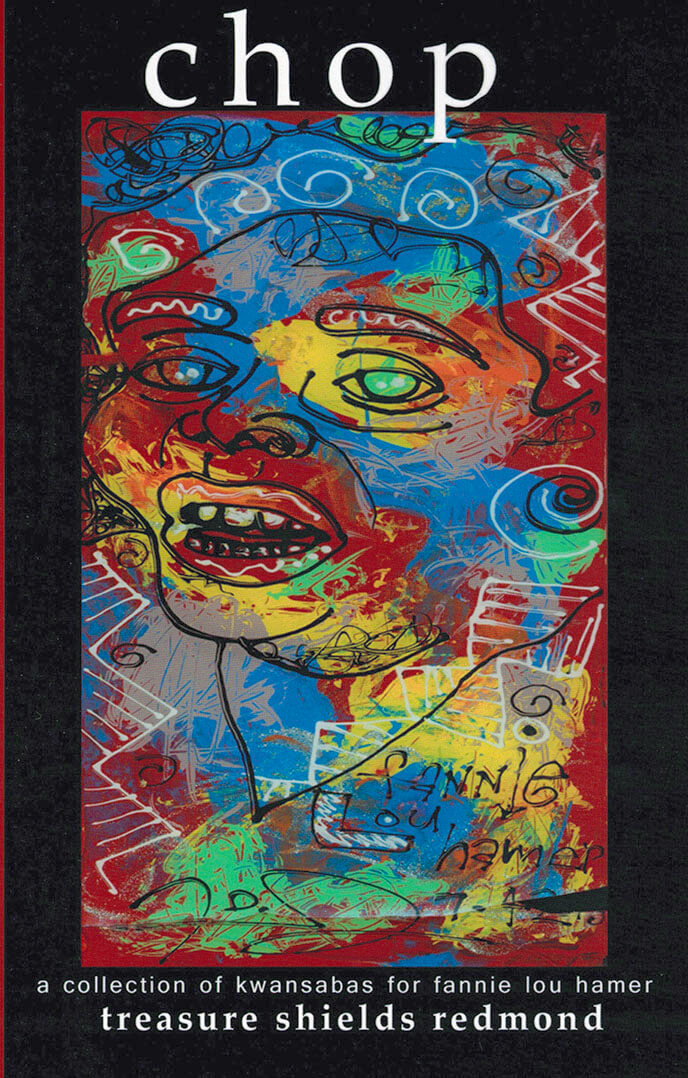
chop: a collection of kwansabas for fannie lou hamer
chop is a collection of poems that center on the life and work of proto-feminist and civil rights activist, Fannie Lou Hamer.
A Mississippi native, Treasure Shields Redmond is a poet, speaker, diversity and inclusion coach, and social justice educator. In 2016 she founded her company, Feminine Pronoun Consultants, LLC. Even though Treasure is completing a PhD in English Literature and Criticism, is a published writer, gifted veteran educator, and has spoken on stages all over the U.S. and in Europe, she uses her humble beginnings in the federal housing projects in Meridian, Mississippi to fuel her passion for helping college-bound families navigate college admissions painlessly and pro tably, and o ering perceptive leaders creative diversity and inclusion facilitation. Additional information on her poetry, writing, and multidimensional practice are available at: www.FemininePronoun.com.

The Power of Adrienne Rich: A Biography
The first comprehensive biography of Adrienne Rich, feminist and queer icon and internationally revered National Book Award winning poet.
Adrienne Rich was the female face of American poetry for decades. Her forceful, uncompromising writing has more than stood the test of time, and the life of the woman behind the words is equally impressive. Motivated by personal revelations, Rich transformed herself from a traditional, Radcliffe-educated lyric poet and married mother of three sons into a path-breaking lesbian-feminist author of prose as well as poetry. In doing so, she emerged as both architect and exemplar of the modern feminist movement, breaking ranks to denounce the male-dominated literary establishment and paving the way for the many queer women of letters to take their places in the cultural mainstream. Drawing on a wealth of unpublished materials, including Rich's correspondence and in-depth interviews with numerous people who knew her, Hilary Holladay digs deep into never-before-accessed sources to portray Rich in full dimension and vivid, human detail.

The Complete Text Would Be Insufferable / Language as Prosthesis
We begin with the image of an idea in ruin. A small field of assumptions disassembled. A question no longer in need of its mark. A thought not sure where it began. It starts from the body and language. The debris of these three words, crumbling already at and, did not break apart but congealed the separations once made. We start from a research (project) undone and just beginning.
Typesetting and design: Will Holder
Produced by: A.pass
Chloe Chignell works across choreography and publication taking the body as the central problem, question and location of the research. She invests in writing as a body building practice, examining the ways in which language makes us up.
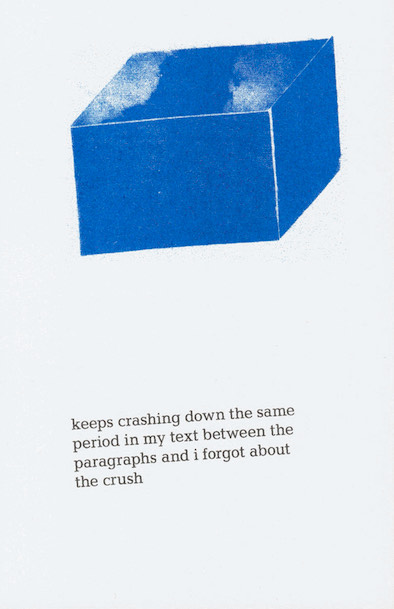
keeps crashing down the same
keeps crashing down the same period in my text between the paragraphs and i forgot about the crush is a book by Stine Sampers, 114 pages of her collected "predictive text songs" written between April 2018 and January 2019 in Brussels, Ghent, Antwerp, Alveringem, Amsterdam and Berrias-et-Casteljau with a Samsung Galaxy S5 (stolen in October 2018 in Brussels) and a Samsung Galaxy S7 (that had to be taught vocabulary). Cover image by Deveny Faruque, afterword by Maru Mushtrieva:
"Here, the longing for the Other – unsurmountable distance – is actualized not only by the content but also by the compositional design itself. What at first glance appears to be a stream of consciousness, is in fact a synthesis of vocabulary from past text messages. While composing them, Stine Sampers used her phone’s algorithm to decide what to say next, with suggestions coming from the text messages previously exchanged with her friends. The words from different contexts, once chosen carefully, now belong to the careless vocabulary of a machine, welcomed into a loop of misrecognition."
Published Nov 2020
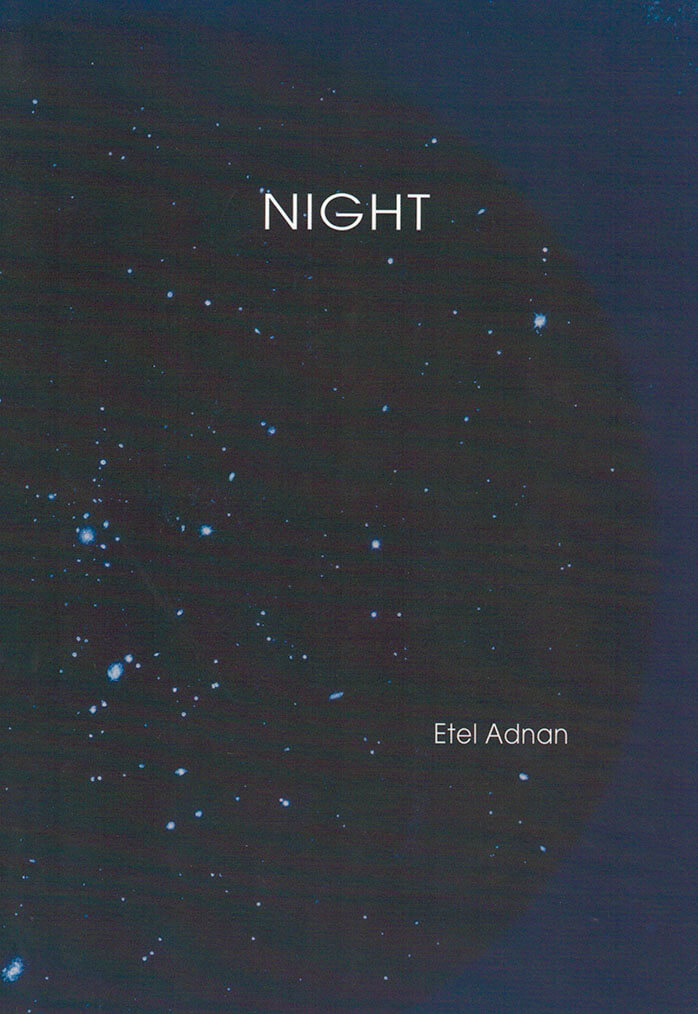
Night
Born in 1925 in Beirut, ETEL ADNAN has written more than a dozen books of poetry, fiction, and essays. A two-volume collection, To look at the sea is to become what one is: An Etel Adnan Reader, was published in 2014. She is a recipient of a PEN Oakland-Josephine Miles Award, the California Book Award, a Lambda Book Award, and a Chevalier des Arts et des Lettres. She lives in Paris and Sausalito, California.
"Trained in philosophy, Beirut-born author/activist Adnan blends a meditation on the meaning of memory with memories themselves, dredged up from a long life. And surely night, her setting here, is the time for such dredging. Adnan rigorously asserts that "reason and memory move together." But she argues that "a remembered event is a return to a mystery," and her writing is eye-openingly lush, gorgeous, even surreal ("waves of roses are blanketing memory"), showing us the mind at work on its unstructured, uncertain edges. The epigrammatic ending, "Conversations with my soul" ("Why are we lonelier when/ together"), will feed even those who don't typically read poetry. VERDICT A good way for sophisticated readers to recall why they first loved verse." — Library Journal

chris mann and grammar
A Lingua Press Bookplay, 1990
Introduction by Kenneth Gaburo,Herbert Brun, Annea Lockwood, David Dunn,John Cage.
Chris Mann (March 9, 1949 Australia–September 12, 2018 New York NY) was an Australian composer, poet and performer specializing in the emerging field of compositional linguistics, coined by Kenneth Gaburo and described by Mann as "the mechanism whereby you understand what I'm saying better than I do".[1] He was, in the last 2 decades of his life, based in New York City.
Mann studied Chinese and linguistics at the University of Melbourne, and his interest in language, systems, and philosophy is evident in his work. Mann founded the New Music Centre in 1972 and taught at the State College of Victoria in the mid-1970s. He then left teaching to work on research projects involving cultural ideas of information theory and has been recognized by UNESCO for his work in that field.[1]
Mann moved to New York in the 1980s and was an associate of American composers John Cage and Kenneth Gaburo. He performed text in collaboration with artists such as Thomas Buckner, David Dunn, Annea Lockwood, Larry Polansky, and Robert Rauschenberg.
Mann recorded with the ensemble Machine For Making Sense with Amanda Stewart, Rik Rue and others, Chris Mann and the Impediments (with two backup singers and Mann reading a text simultaneously while only being able to hear one another), and Chris Mann and The Use. His piece The Plato Songs, a collaboration with Holland Hopson and R. Luke DuBois, features realtime spectral analysis and parsing of the voice into multiple channels based on phonemes. Mann has also participated in the 60x60 project.[2]
Mann taught in the Media Studies Graduate program at The New School. He died in September 2018 after a recurrence of cancer. He is survived by his wife and two children.

Minerva - the Miscarriage of the Brain
Minerva the Miscarriage of the Brain collects a decade of work from artist, musician, and author of On Hell, Johanna Hedva. In plays, performances, an encyclopedia, essays, autohagiography, hypnagogic, and hypnapompic poems—in texts whose bodies drift and delight in form—Minerva tunnels into mysticism, madness, motherhood, and magic. Minerva gets dirty with the mess of gender and genius. She does the labor of sleep and dreams. She odysseys through Los Angeles, shapeshifting in stygian night and waking up to wail in the light.
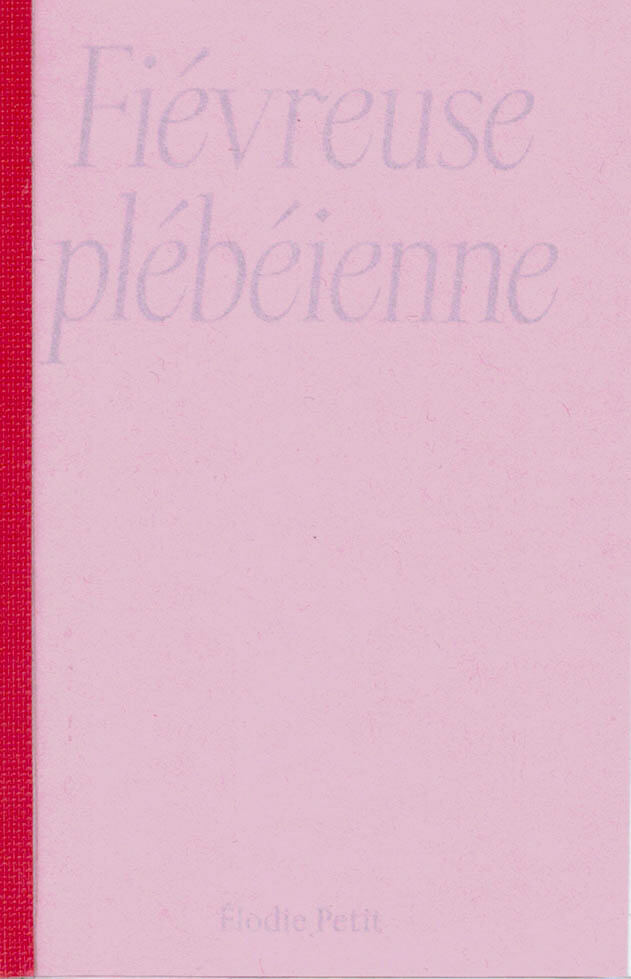
Fiévreuse plébéienne
« On habite ce que l’on peut : la faïence, la baignoire, le hlm, le trottoir, on construit une cabane. Du début à la fin on utilise l’amour comme survie collective. » Fiévreuse plébéienne, Élodie Petit
Fiévreuse plébéienne est un texte en cours qui interroge la façon d’habiter son corps, le monde, ses désirs. Ça parle d’amour, de précarité et de sexualité. Ça emmêle directement le corps au politique, ça prône haut et fort l’expérimentation et le plagiat, ça mélange Dirty dancing pour les gouines et une volonté très forte de faire la révolution. Fiévreuse plébéienne est un livre nouveau de poésie, une recherche durable dans l’écriture sexuelle, une expérience intime.
À lire :
– les zines sur www.elodiepetit.fr
– Elodie Petit : « Que chacune rie à outrance et que les trous du cul soient dilatés » (Fiévreuse plébéienne) de Pierre Niedergang dans Diacritik
– Fiévreuse plébéienne : l’écriture en giclures d’Elodie Petit de Zaz dans Friction Magazine

We Want It All: An Anthology of Radical Transpoetics
An anthology of formally inventive writing by trans poets against capital and empire.
With texts by: Andrea Abi-Karam, New York City Sam Ace, South Hadley, MA Bahaar Ahsan, Berkeley, CA jasper avery, Philadelphia, PA Ari Banias, Berkeley, CA Jo Barchi, Chicago, IL Joss Barton, St. Louis, MO Levi Bentley, Philadelphia, PA Jessica Bet, Baltimore, MA Rocket Caleshu, Los Angeles, CA Ching-in Chen, Seattle, WA listen chen, Vancouver, BC Faye Chevalier, Philadelphia, PA Cody-Rose Clevidence, Arkansas Miles Collins-Sibley, Easthampton, MA Valentine Conaty, New York City CA Conrad, Philadelphia, PA Jimmy Cooper, Rochester, MI Maxe Crandall, Oakland, CA José Díaz, Boston, MA Aaron El Sabrout, New Mexico Ian Khara Ellasante, Lewiston, ME Caelan Ernest, New York City, NY NM Esc, San Diego, CA joshua jennifer espinoza, Los Angeles, CA Logan February, Ibadan, Nigeria Ray Filar, Brighton, UK Nora Collen Fulton, Montreal, Canada Kay Gabriel, New York City Callie Gardner, Cardiff, Wales Jesi Gaston, Chicago, IL Harry Josephine Giles, Edinburgh, Scotland Aeon Ginsberg, Baltimore, MD Caspar Heinemann, Berlin, Germany Kamden Hilliard, Greenville, SC Stephen Ira, New York City Cyrée Jarelle Johnson, New York City Peach Kander, New York City Jayson Keery, Western, MA Evan Kleekamp, Los Angeles, CA Noah LeBien, New York City Ty Little, Richmond, VA Zavé Martohardjono, New York City Amy Marvin, Philadelphia, PA Natalie Mesnard, New York City Bianca Rae Messinger, Iowa City, IA Liam O'Brien, New York City Xandria Phillips, Madison, WI Rowan Powell, Santa Cruz, CA Nat Raha, Edinburgh, Scotland Holly Raymond, Philadelphia, PA Jackie S, New York City Trish Salah, Toronto, Canada Raquel Salas Rivera, Philadelphia, PA Mai Schwartz, New York City Kashif Sharma-Patel, London, UK Julian Talamantez Brolaski, Oakland, CA Charles Theonia, New York City Jamie Townsend, Oakland, CA Nora Treatbaby Laurel Uziell, London, UK Rachel Franklin Wood, Boulder, CO Clara Zornado Akasha-Mitra xtian w. and Anaïs Duplan, NYC.
Kay Gabriel is a poet and essayist. She's the author of Elegy Department Spring / Candy Sonnets 1 (BOAAT Press, 2017), the recipient of fellowships from Lambda Literary and the Poetry Project, and recently completed her PhD at Princeton University.
Andrea Abi-Karam is an arab-american genderqueer punk poet-performer cyborg, writing on the art of killing bros, the intricacies of cyborg bodies, trauma & delayed healing. Their chapbook, THE AFTERMATH (Commune Editions), attempts to queer Fanon's vision of how poetry fails to inspire revolution. Andrea's first book, EXTRATRANSMISSION (Kelsey Street Press, 2019), is a poetic critique of the U.S. military's role in the War on Terror.
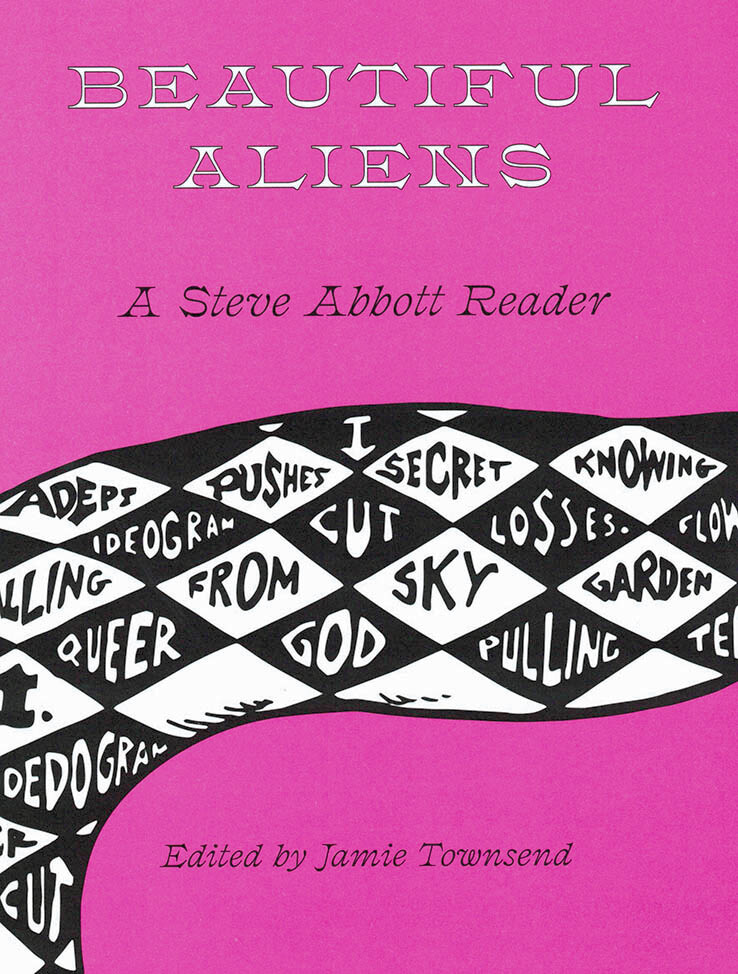
Beautiful Aliens: A Steve Abbott Reader
Beautiful Aliens: A Steve Abbott Reader is a landmark collection representing the visionary life's work of beloved Bay Area luminary Steve Abbott. It brings together a broad cross-section of literary and artistic work spanning three decades of poetry, fiction, collage, comics, essays, and autobiography, including underground classics like, Lives of the Poets and Holy Terror, rare pieces of treasured ephemera, and previously unpublished material, representing a survey of Abbott's multivalent practice, as well as reinforcing his essential role within the contemporary canon of queer arts.
"Holy Terror is good reading, well written and extremely knowledgeable about the subject of magic black and white. In fact, all magic is both."—William Burroughs
"All of us who knew the late Steve Abbott will now be happy that the stone has rolled back, to reveal the amazing accomplishment of Beautiful Aliens, poet Jamie Townsend's masterful take on Steve's multigenre work. Prose, poetry, journalism, the essay, the comic book, the novel: Steve was driven to try his hand at all these categories, excelling more often then you'd think possible. It's time that people knew a genius (of sorts) once lived at the corner of Haight and Ashbury." — Kevin Killian
Steve Abbott (1943-1992) was a poet, critic, editor, novelist and artist. Abbott was raised in Lincoln, Nebraska, graduated from the University of Nebraska, and attended Emory University where he was an organizer for Atlanta's Gay Liberation Front and the gay lib editor at the underground paper The Great Speckled Bird. Abbott moved to San Francisco in 1974 where he became was a frequent contributor to local publications, including The Advocate, The Sentinel, and the Bay Area Reporter. He was also one of the founding editors of the literary arts newsletter Poetry Flash and the publisher/editor of the literary journal Soup. Steve wrote a number of books of poetry and prose during the 1980s and early 90s including: "Wrecked Hearts", "Stretching the Agape Bra", "Lives of the Poets", "Holy Terror", "Skinny Trip to a Far Place", and "View Askew: Postmodern Investigations", a book that collects Steve's essays from The San Francisco Sentinel, The Advocate, and the arts journal Mirage. He was active in various reading series and discussion groups in the Bay Area, including Cloud House and Small Press Traffic, and, in 1981, he co-organized the historic Left/Write conference. Steve was also a respected critic and the first to use the term "New Narrative" to describe the work of contemporaries including Bruce Boone and Robert Glück. Abbott died of complications due to AIDS on December 2, 1992. His novel The Lizard Club was published posthumously. Jamie Townsend is a genderqueer poet, publisher, and editor living in Oakland, California. They are half-responsible for Elderly, a publishing experiment and persistent hub of ebullience and disgust. They are the author of several chapbooks including, most recently, Pyramid Song (2018) as well as the full-length collection SHADE (2015). An essay on the history of the New Narrative magazine Soup was published in The Bigness of Things: New Narrative and Visual Culture (2017).
Published December 2019.
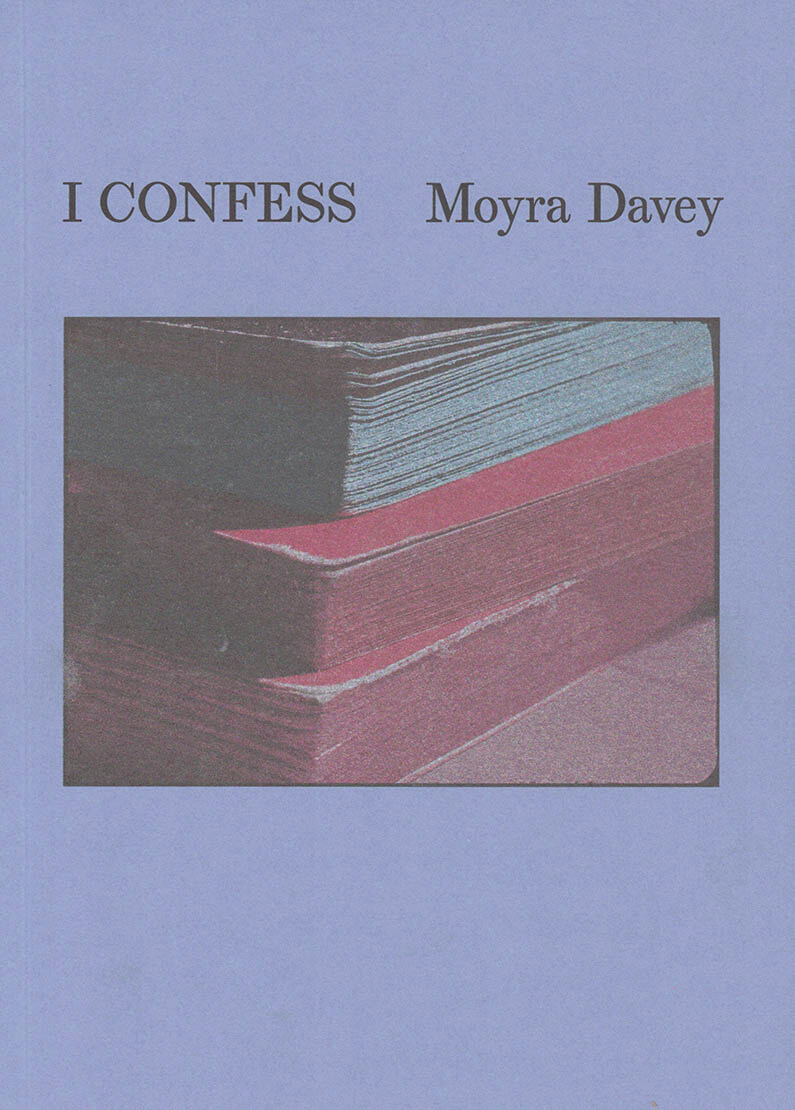
I Confess
Over the past 40 years, Canadian artist Moyra Davey (born 1958) has perfected a unique synthesis of photography, film and text to critically engage with the past, present and future of the world around her. Based on Davey's eponymous 2019 film, I Confess unites three main sources in a chronicle of late 20th-century Quebec, shaped by themes of race, poverty, language and nationalism. Using American writer James Baldwin's 1962 novel Another Country as its point of departure, Davey's film also focuses on the life and work of Québécois revolutionary Pierre Vallières and Ottawa-based political philosopher Dalie Giroux.
Published to accompany the exhibition Moyra Davey: The Faithful at the National Gallery of Canada, this deeply personal and highly political book seeks to examine an unresolved chapter of Québécois history from a uniquely interdisciplinary perspective that draws attention to contemporary issues of separatism, while reflecting the artist's understanding of photography and text as unique corollaries. This publication features writings by the artist, Dalie Giroux and National Gallery of Canada's Associate Curator Andrea Kunard, and a poster insert.
Published September 2020.
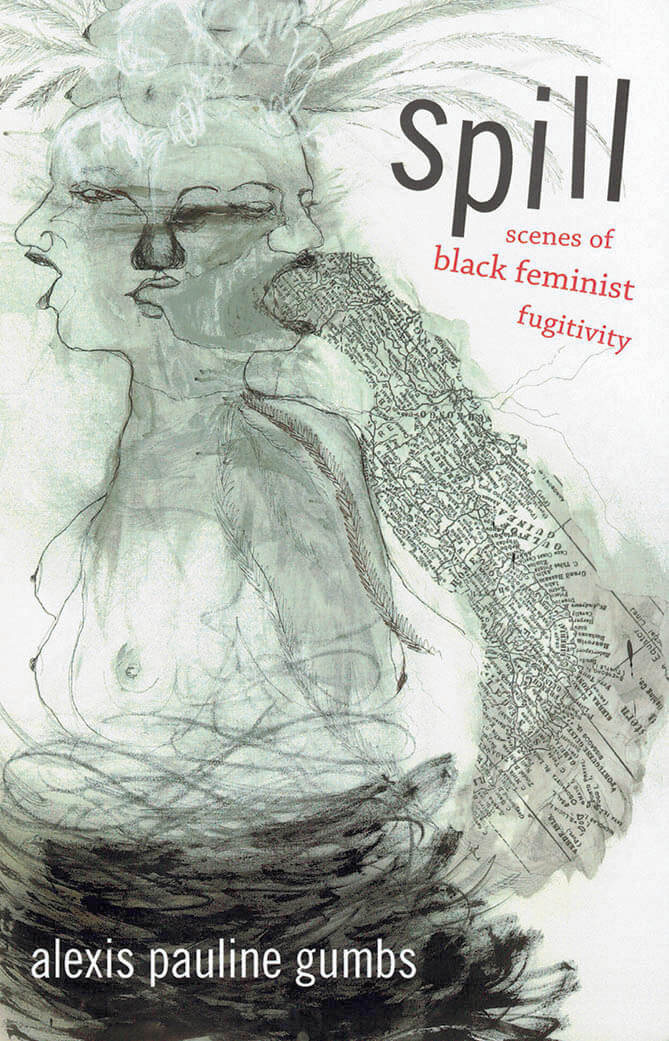
Spill: scenes of black feminist fugitivity
In Spill, self-described queer Black troublemaker and Black feminist love evangelist Alexis Pauline Gumbs presents a commanding collection of scenes depicting fugitive Black women and girls seeking freedom from gendered violence and racism. In this poetic work inspired by Hortense Spillers, Gumbs offers an alternative approach to Black feminist literary criticism, historiography, and the interactive practice of relating to the words of Black feminist thinkers. Gumbs not only speaks to the spiritual, bodily, and otherworldly experience of Black women but also allows readers to imagine new possibilities for poetry as a portal for understanding and deepening feminist theory.
Alexis Pauline Gumbs is a poet, independent scholar, and activist. She is coeditor of Revolutionary Mothering: Love on the Front Lines and the Founder and Director of Eternal Summer of the Black Feminist Mind, an educational program based in Durham, North Carolina.
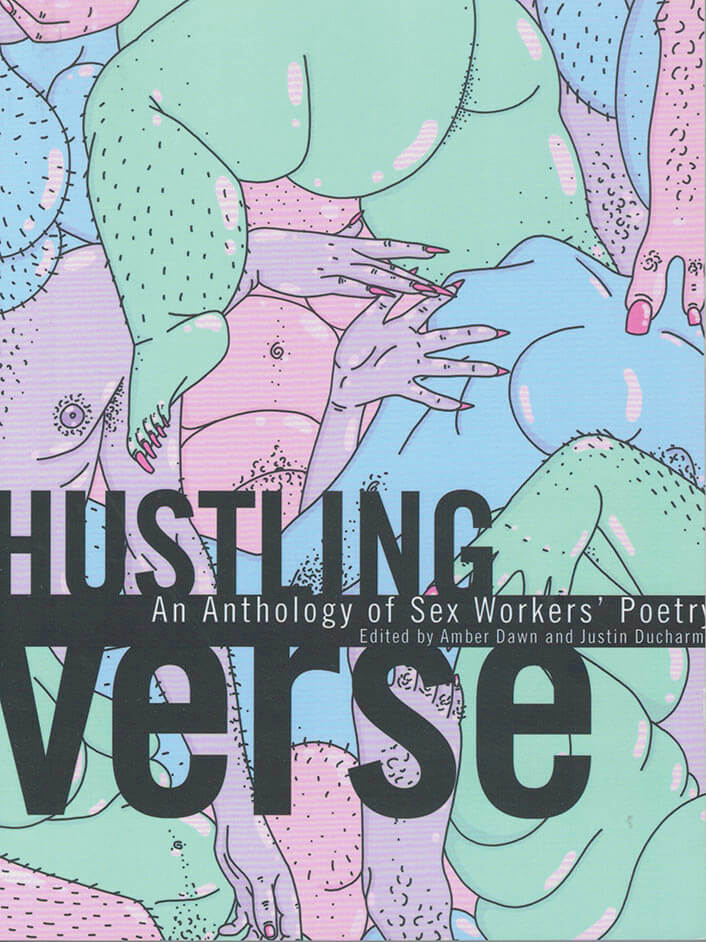
Hustling Verse: An Anthology of Sex Workers' Poetry
In this trailblazing anthology, more than fifty self-identified sex workers from all walks of the industry (survival and trade, past and present) explore their lived experience through the expressive nuance and beauty of poetry. In a variety of forms ranging from lyrics to list poems to found poetry to hybrid works, these authors express themselves with the complexity, agency, and honesty that sex workers are rarely afforded. Contributors from Canada, the US, Europe, and Asia include Gregory Scofield, Tracy Quan, Summer Wright, and Akira the Hustler. As an antidote to the invasive and often biased media depictions of sex workers, Hustling Verse is a fiercely groundbreaking exploration of intimacy, transactional sex, identity, healing, and resilience.
"With so much scathing insight into human behavior, Hustling Verse is not just about sex work, but about sexual possibility and self-determination for everyone." —Mattilda Bernstein Sycamore, author of Sketchtasy
"The span of these poems - authored by surviving and commerical sex workers, younger and elder sex workers, racialized and Indigenous sex workers, queer and trans and cisgender sex workers - covers enormous ground while remaining united by an unwavering commitment to speaking the truth in all its painful and healing beauty." —Kai Cheng Thom, author of I Hope We Choose Love
Amber Dawn is a white queer femme survivor living in unceded Coast Salish Territories, Vancouver. She is the author of four books (the most recent of which is the novel Sodom Road Exit) and the editor of two anthologies. Her memoir How Poetry Saved My Life: A Hustler's Memoir (2013) won the Vancouver Book Award and was a finalist for the Lambda Literary Award. She teaches creative writing at the University of British Columbia and guest mentors at drop-in, sex work-driven community spaces.
Published October 2019.
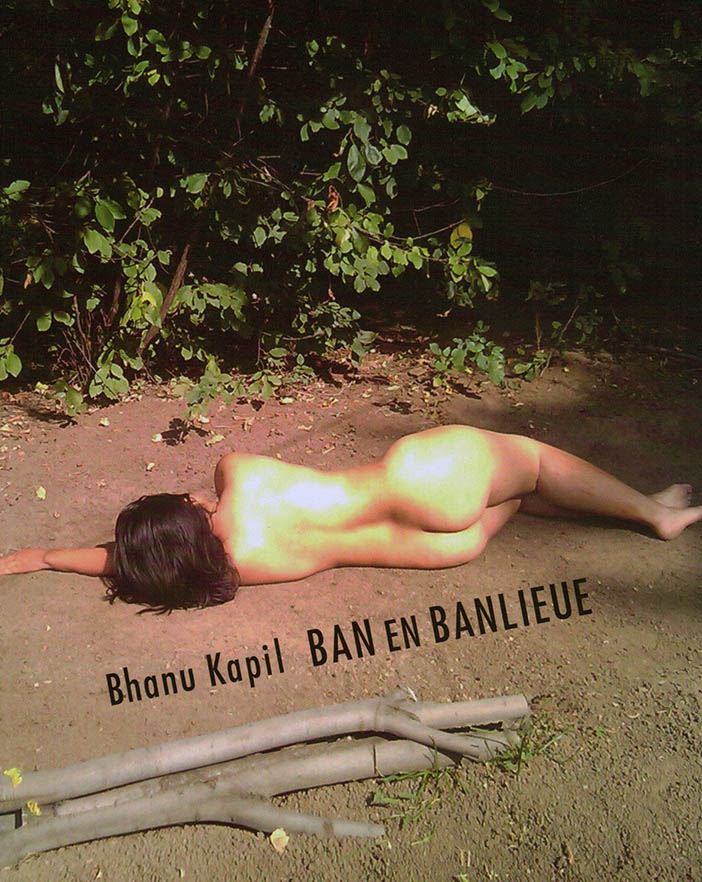
Ban En Banlieue
Bhanu Kapil's 'Ban en Banlieue' follows a brown (black) girl as she walks home from school in the first moments of a riot. An April night in London, in 1979, is the axis of this startling work of overlapping arcs and varying approaches. By the end of the night, Ban moves into an incarnate and untethered presence, becoming all matter - soot, meat, diesel oil and force - as she loops the city with the energy of global weather. Derived from performances in India, England and throughout the U.S., 'Ban en Banlieue' is written at the limit of somatic and civic aims.
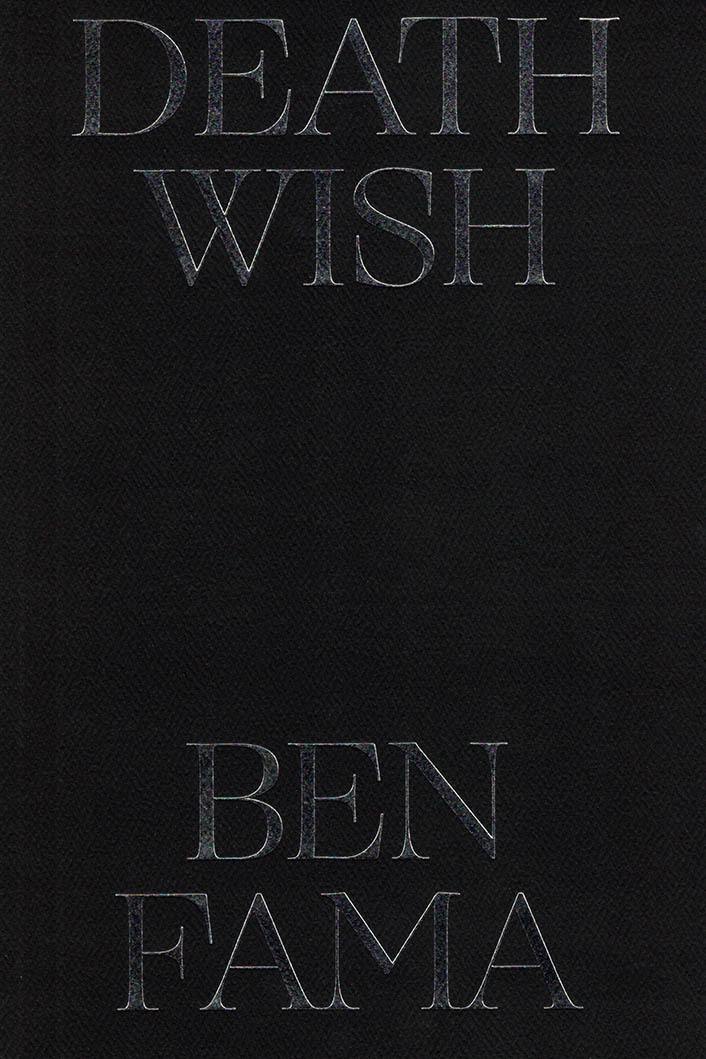
Death Wish
Ben Fama's DEATHWISH drops us back into the beauty and the fantasies teased out in his first book of poetry, FANTASY, re-braiding them through BDSM scenarios, metaphysical inquiries, and the maximalism of the contemporary.
Ben Fama is a writer based in New York City. He is the author of DEATHWISH (Newest York Arts Press, 2019), FANTASY (Ugly Duckling Presse, 2015), and the chapbooks Odalisque (Bloof, 2014), Cool Memories (Spork, 2013), New Waves(Minutes Books, 2011), and Aquarius Rising (Ugly Duckling Presse, 2010). He is also the author of the artist book Mall Witch (Wonder, 2012). He is the co-founder of Wonder.
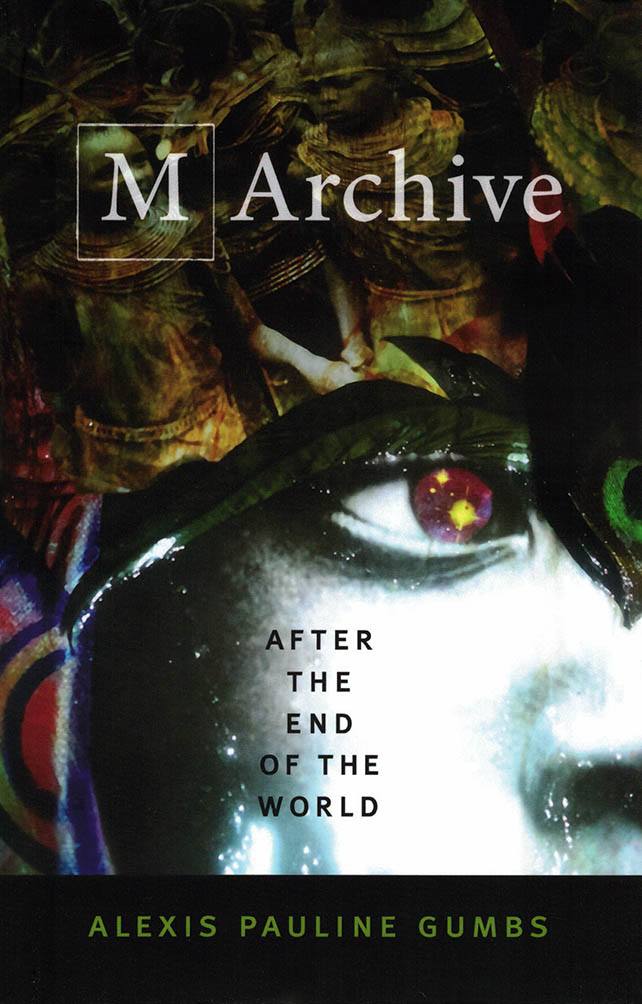
M Archive: After the End of the World
Following the innovative collection Spill, Alexis Pauline Gumbs's M Archive, the second book in a planned experimental triptych, is a series of poetic artifacts that speculatively documents the persistence of Black life following a worldwide cataclysm.
Engaging with the work of the foundational Black feminist theorist M. Jacqui Alexander, and following the trajectory of Gumbs's acclaimed visionary fiction short story "Evidence," M Archive is told from the perspective of a future researcher who uncovers evidence of the conditions of late capitalism, antiblackness, and environmental crisis while examining possibilities of being that exceed the human.
By exploring how Black feminist theory is already after the end of the world, Gumbs reinscribes the possibilities and potentials of scholarship while demonstrating the impossibility of demarcating the lines between art, science, spirit, scholarship, and politics.
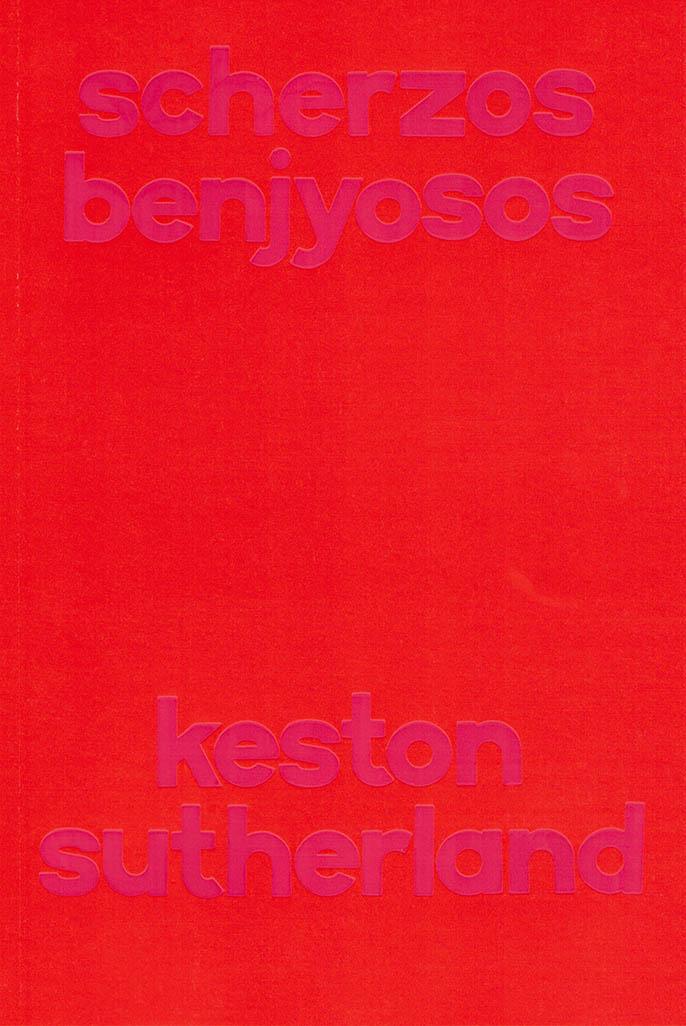
scherzos benjyosos
Scherzos Benjyosos is a set of four poems, scherzos in prosimetrical blocks, a comical, wild, and delirious sifting through the carnage of the financial crash, the dreamscapes of capitalist infancy, histories of sadism and persecution, the fetish bars of canonical literature, and the psychoanalysis of grass. The book also includes “Sinking Feeling,” Sutherland’s long poem from 2017, described by J. H. Prynne as “breathtakingly lovely, and desperate, racked with desire to become truthful love.”
Some reviews of other books by Keston Sutherland:
“[Hot White Andy] is the most remarkable poem in English published this century… A possible poetic future starts here.” — Jacket Magazine
“The most unsettling but also authentically hopeful account of what it is to be human now.” —3AM on The Odes to TL61P
“Immediately takes its place among the most essential works of literature in English in this new millennium.” — Chicago Review on Poetical Works 1999 –2015
“[‘Sinking Feeling’] moves like a piece of music through recursive and repeated moments, shifting and developing its described and conceptual spaces, its logics of representation, and its narrative. The thinking it follows is not always easy, but the disorienting effect on the reader is exhilarating because of the intellectual and emotional space it opens up as you try to follow it.” — London Review of Books
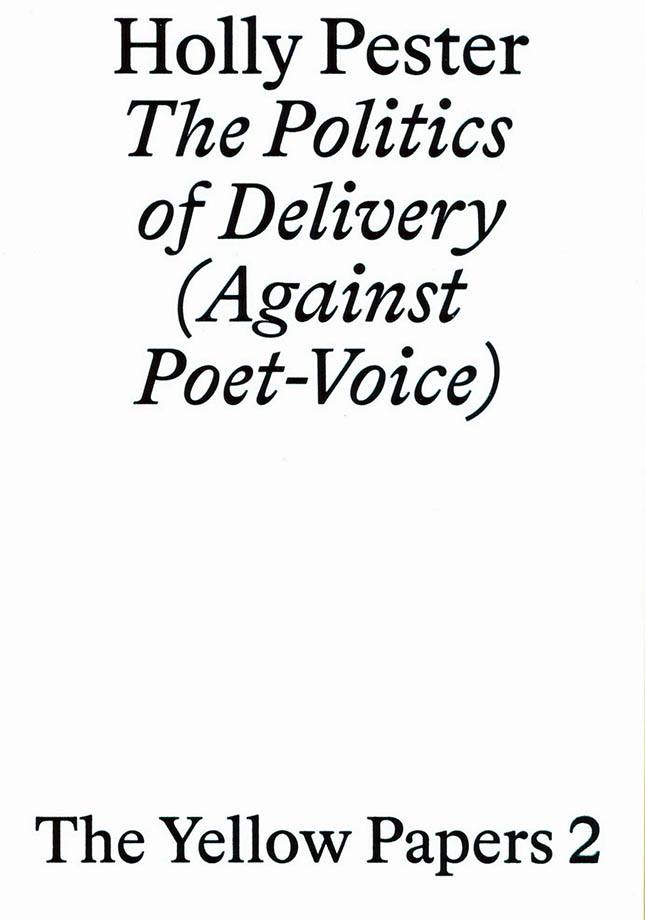
The Politics of Delivery (Against Poet-Voice)
An essay by Holly Pester on prosody, “poet-voice,” and the politics of delivery.
“Following a political impulse that I cannot shake, I want to oppose poet-voice. Not to smirk, but to suggest that poet-voice, that is, to lay a given mutual voice on top of the text, is a kind of opting out. It’s a self-absolving move. What’s being opted out of is the rough stuff of delivery and the ethical shrapnel in intonation. Such materials of poetic intonation are not, I will argue, irrelevant to the political questions of one’s speech in society and its disputed freedoms.
I have a fully felt and fraught relationship with delivery. I care about delivery compositionally; I enjoy the effects of composition working on and into my voice. Sometimes it feels as if my voice is the victim of some impossible contract with the text. The effort and timbres of delivery are therefore potentially very significant to a political poet. This sounded aspect of my work often gets short-handed as performance, but it’s not that. Performance art and performance poetry are distinct art forms with histories and styles, learned and studied by talented performers. Delivery is as banal or as eccentric as the material, but not necessarily correspondingly. It is part of the craft of poetry that isn’t unrelated to the intrinsic vocal identity of the poet (accent, etc.) yet has as much to do with tensions within the communities, heritages, and civics of poetry as with the individual. ”
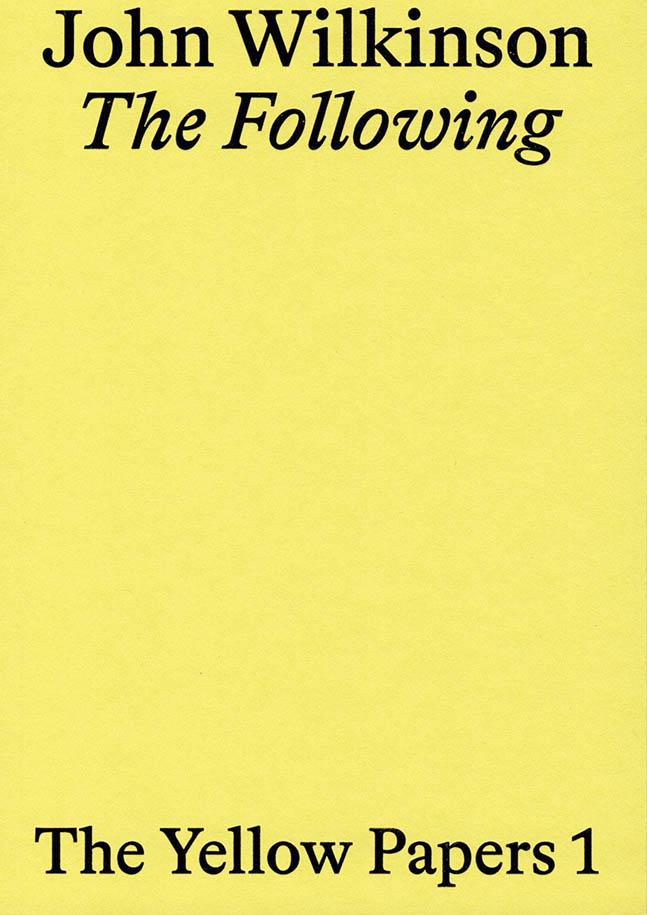
The Following
The Following selects from John Wilkinson’s essays of the last three decades, with a preference for what has come to be known as creative criticism, and adds a new essay on reflected boughs in poems by Shelley and a photograph by Sally Mann, and a poem in homage to Sean Bonney. The book’s title is a broken reflection of the essay title “Following the Poem.”
“Through following a poem (not just any poem), a reader can become involved in the evocation and enactment of a radical hybridity, pulling together ways of thinking about the world modernity has categorically but falsely separated; but such reading takes place in time, so continuously a reader unpicks and reintegrates elements of the poem in a felt motion which can restore a healed and full being in the world, involving in its fullness and as a condition of it, the detours, the lapses, and the breaks in his or her journey.”
